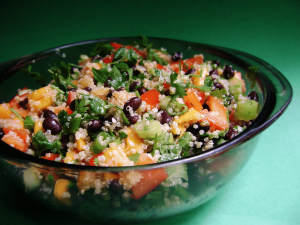By Heide Kennedy, Arizona Farm Bureau Communications Intern
Quinoa, the teeny tiny little grain that packs a huge punch of nutritional benefits. It has also become super trendy in recent years, and it’s easy to find so many different recipes that use it. Here, we break down just how nutrient-filled this little grain is, as well as how it can actually help to prevent type 2 diabetes. 
According to Dr. Nicole Avena, quinoa is one of the few whole grains that is also a complete protein as well. Being a complete protein basically means that it contains all of the 9 essential amino acids. Because of its high fiber and high protein content, quinoa is great for building and repairing muscles, increasing satiety, and slowing your digestion, which in turn slows your blood sugar release.
But those nutritional benefits of quinoa aren’t all that it boasts. According to a new study, regularly consuming quinoa has been shown to help prevent the development of type 2 diabetes. Researchers compared the blood sugar levels of those who ate regular carbohydrates with those who ate quinoa instead. Those who ate quinoa reported having fewer blood sugar spikes than those who ate regular carbohydrates. This can be attributed to the high fiber content, which blocks the rise of blood sugar. Also, quinoa is high in protein, which helps to combat the blood sugar spike that results from eating carbohydrates as well.
Who knew that there could be so much nutrition contained in such a small little grain? Consider incorporating more quinoa into your diet, not only because it can provide you with so many nutritional benefits, but it is also super delicious in my opinion!
For more nutrition articles, check out the Fill Your Plate blog!





 According to the
According to the